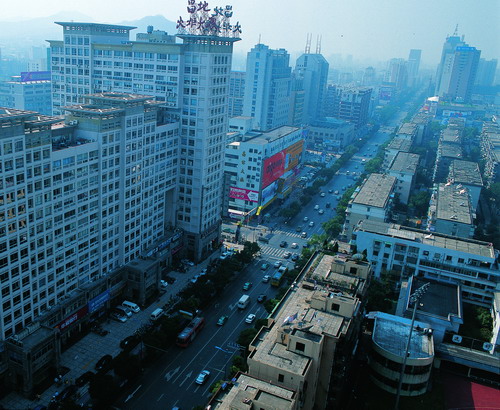
In the past few years, I have been to New York, Los Angeles, Shang
Hai, and many other big cities in the world, but, surprisingly, I don't
like any of them. All I could remember were enormous buildings,
endless traffics, and crowed people on the streets where one could hardly see
the sky. In the past decades, the overwhelmingly urban population, due to the vast economic
development recently, has put lots of pressure on demand of houses and public
facilities. Consequently, more constructions were scheduled and they created a huge
harmful affect on the environment. For example, construction will tear down
forests and hills in order to have enough lands. Increasing dwellers created a greater demand on energy. Also, there will be an increase in the landfill of
trashes, since people are making more trashes that mainly made out of harmful
chemicals. As time went on, birds, and small animals gradually disappeared in cities in China that are full with human productions.
But is it true that a city's development could never be environmental friendly? Or a city's development has to be built on the cost of sacrificing the nature?
“In heaven there is paradise/ On earth, Suzhou and Hangzhou.”
Thousands years ago, Marco Polo, a famous traveler who have been to Hangzhou, answered the question already. Hangzhou, a city 2 hours' drive from Shanghai, nicely incorporates city's urban development with environmental themes and considered such connection as the main focus of the city's development.
Geologically, Hangzhou with 6 million population can be divided into two parts: the urban areas where most people lived and work, and the lake. As you can see from the picture above, the west part of city is full with buildings, constructions and people. But on the east side, the city governors tried to create at least human tracks as possible. The forests and the lake become the natural lungs of the city. Each day, they will absorb the waste gases and turn them intofresh air to improve the air quality of Hangzhou. Each year, the government will spend millions of dollars on the preservation of the lake. But, in turn, the unique lake also brought ever growing tourists groups to the cities. Their consumptions will be excellent sources for next year's budget that will make the lake even better and attract even more tourists. A nice sustainable cycles.
 |
| Nowadays, more and more people in Hangzhou woke early and have morning exercises like running, playing "Taiji," a traditional marshal arts, and walking. |
 When people walked in the city, they not only would see the monotonic buildings but also could enjoy the greenness, which is rare in other bigger cities in China. There will be trees on almost every sidewalk and main streets in the entire city (including downtown). Those trees greatly reduced the particle and noise pollution which cars created and, in some extent, brought livelihood to the city. One can even hear birds' singing in the morning, which is impossible several years ago in the downtown of Hangzhou. My parents told me that they still remembered the lifeless streets in downtown when have nothing but buildings and shops. They said like the downtown now much better.
When people walked in the city, they not only would see the monotonic buildings but also could enjoy the greenness, which is rare in other bigger cities in China. There will be trees on almost every sidewalk and main streets in the entire city (including downtown). Those trees greatly reduced the particle and noise pollution which cars created and, in some extent, brought livelihood to the city. One can even hear birds' singing in the morning, which is impossible several years ago in the downtown of Hangzhou. My parents told me that they still remembered the lifeless streets in downtown when have nothing but buildings and shops. They said like the downtown now much better. |
| energy efficient buses |
 |
| free bikes for rent |
I've heard couple new projects that will happened soon and make Hangzhou even prettier as a modern city. For example, project like building green roofs on top of buildings, turning mud that deposited in rivers into wetlands...etc. I believed Hangzhou will be the paradise of China, for its uniques focus on connections between nature and urban development, and for its historical culture remains.
I love Hangzhou!!!! 杭州
Hangzhou
For more information, you are welcome to check the articles from New York Times below.


I have been to China before too! I agree, their transportation system is more efficient, I think we should be less dependent on cars and help the environment like hangzhou does. Plus it helps decrease pollution and saves money.
ReplyDelete